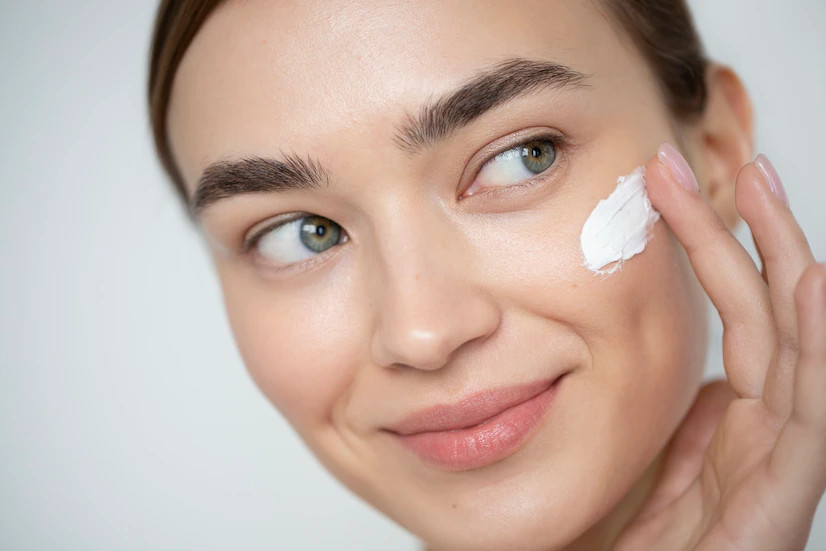One skincare product that you should use on a regular basis is moisturizer. Using a moisturizer that suits your skin's needs can prevent dry skin and keep your face looking young. How do moisturizers work, and how do you choose the right one for your skin type? Check out the review below.
What is a moisturizer?
Skin has three distinct layers: the outer layer (epidermis), the middle layer (dermis), and the lower layer (hypodermis, or fat layer). Moisturizers are skincare products that keep your skin healthy and hydrated while shielding it from potentially harmful environmental elements.
Moisturizers function in two main ways: either they retain moisture in the skin to keep it from escaping, or they replenish moisture that has been lost from the skin's outer layers. Moisturizers contain oily compounds that help keep water on the skin. As the weather gets drier, more water evaporates out of the skin into the atmosphere, which leads to dry skin. This evaporation causes the skin to peel and crack. Using a moisturizer is essential to preventing dry skin.
In addition to preventing dry skin, moisturizers help maintain the health of the skin's protective layer, which shields the skin from potentially irritating substances.
Various types of moisturizer
To keep your skin hydrated and prevent premature aging, experts advise using moisturizer on a daily basis. You can match your skin type to the types of moisturizers available on the market when selecting one, specifically:
1. Lotion
Lotion has a thinner and lighter consistency than cream. Compared to creams, lotions contain less oil. This kind of moisturizer is suitable for young adults and those with normal skin. If you have combination skin, use a gel or lotion moisturizer for the oilier and drier sections of your skin, respectively.
2. Cream
Creams contain more oil than gels and lotions and are more hydrating than lotions. Although more hydrating, creams are not the thickest type of moisturizer. If you have dry skin, you can use a cream to moisturize your skin. Perimenopausal people as well as those aged 50 and older can also use cream moisturizers, as with age, the skin holds less and less moisture.
3. Ointment
Ointments are the thickest and heaviest type of moisturizer due to their higher oil content. You can moisturize your body and face with ointment moisturizers. Doctors often recommend this type of moisturizer to treat eczema patients' dry, scaly skin.
Tips for choosing a moisturizer
When selecting a moisturizer, there are a few more factors to take into account in addition to matching the type to your skin type, such as:
Check the content of ingredients
According to a report from the American Academy of Dermatology Association, it is advised to select a moisturizer with ingredients like hyaluronic acid, which has moisturizing properties, and ceramide, a lipid molecule that aids in hydrating the skin. When choosing a moisturizer, avoid using moisturizers that contain fragrances, as they can irritate dry skin.
Go with non-comedogenic
Choose a moisturizer that is non-comedogenic or does not clog pores. These products are safe to use on dry, acne-prone skin types and typically do not contain oil.
In order to optimize the moisturizing properties of your moisturizer, apply it immediately after cleansing your face. Moisturize your face, starting from the outside and working your way up to your neck.
If you need medical advice or consultation, you can either visit a doctor or make use of the consultation features that are available in the Ai Care application by downloading the Ai Care application from the App Store or Play Store.
Looking for more tips and tricks for health, first aid, and other home treatments? Click here!
- Sean Edbert Lim, MBBS
Health Harvard. Mositurizers: Do They Work?. Available from: https://www.health.harvard.edu/staying-healthy/moisturizers-do-they-work
Cole, G. (2023). Dry Skin. Available from: https://www.medicinenet.com/dry_skin/article.htm
American Academy of Dermatology Association. Available from: https://www.aad.org/public/everyday-care/skin-care-basics/dry/pick-moisturizer
Xue F. (2023). Wait, Is Moisturizer Even Necessary? 3 Derms Weigh In. Available from: https://www.byrdie.com/moisturizer-bad-for-skin
Boulanger, A. (2020). Choosing a Healthy Facial Moisturizer. Available from: https://www.healthline.com/health/cosmetic-safety/healthy-facial-moisturizers
Migala, J. (2023). Skin Moisturizers 101: Why to Use One, Types, and Ingredients to Look for. Available from: https://www.everydayhealth.com/healthy-skin/skin-moisturizers-101-why-to-use-one-types-and-ingredients-to-look-for/











